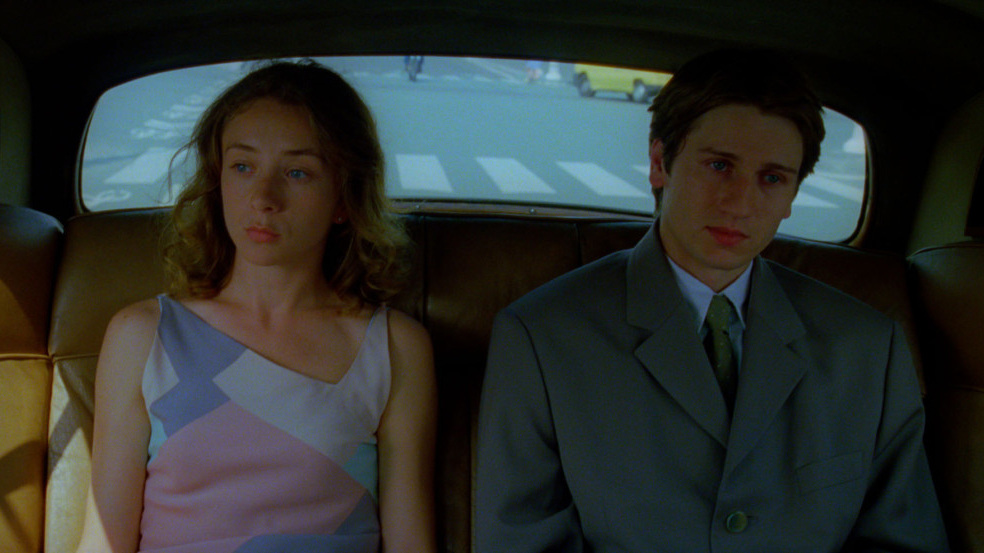Naseauting and depraved. Erotic, eerie and perverted. Chantal Ackerman’s film La Captive or The Captive (2000) is an adaptation of Marcel Proust’s La Prisonnière (1923) that asks the question: is one’s self-professed desire to understand another truly rooted in love, or is it merely a guise for his insatiable need for control?
La Captive follows Simon, played by Stanislav Merhar, and his obsession with his lover, Ariane (Sylvie Testud), who lives in his large apartment in France. Simon wants to know everything about Ariane which gives rise to his obsessive endeavours and excessive questioning of Andrée, whom he assumes to be Ariane’s lover. He becomes all-consumed with the belief that Ariane is cheating on him with women and that since she had sapphic relationships in the past, she is unable to love him the same.
La Captive had me uncomfortable from the opening shots all the way to the ambiguous ending. I constantly wanted to cover my eyes but I peeked through the gaps, eager to see what was going to happen next. From the title to the atmosphere to the casting, Ackerman leaves nothing unsaid as she explores the interplay between control, desire and the darker aspects of human nature.
The casting is inspired; Testud is composed and sleek in her movements to surround Ariane in a sense of enigma. Even the way she walks and holds herself is mysterious, and it is easy to become enthralled by her.
Stanislav Merhar’s Simon captures the possessiveness that can arise from uninhibited male desire whilst simultaneously never letting the viewer know when this need to control is going to peak, or how far it will go. Although he is never physically violent — other than forcibly removing her once from her group of friends — this does not make him any less threatening, in fact it makes him more so.
There is the idea that the only predator is the physically violent stalker, the one who watches waiting for the moment appropriate enough to kill — but Simon is the opposite of this. Instead, he is insecure and shy, unable to love her in the light. Simon’s insecurity is projected further than his movements, and within the couple’s intimate moments. It manifests in his inability to engage with Ariane authentically, she feigns sleep during sex as part of an unspoken, but nonetheless coercive arrangement.
Simon epitomises one of the most insidious types of men; their need for control festers quietly when left unaddressed, posing a significant danger to women. He doesn’t love Ariane, he yearns to control her.
A clever, meta aspect of the casting shows this as the actors have zero chemistry. Their intimate scenes feel awkward, with each kiss coming across as forced. Instead of a show of affection, it’s a power play. While bad chemistry might be argued as something that makes this film poor, I disagree. I think the painful uncomfort shows how desperate Simon is to know her, to control her, and he can’t, which is what kills him. His inability to control her in turn fuels his need to understand her. He is continuously motivated because he thinks that once he knows her, he’ll be able to control her. Unfortunately for Simon — fortunately for Ariane — he learns it is not that simple.
Simon constantly refers to her past life, in which she dated women, and tries to understand what two women loving each other is like, but he cannot. It is this idea of entitlement that makes Simon’s presence feel so unnerving and so dangerous, both for Ariane and the viewer. Throughout the film Ariane does lie to him about things — mainly white lies — but that doesn’t make her this secretive manipulator that Simon is convinced she is.
Simon’s fear of Ariane’s secrets transcends mere trepidation; it embodies a deep-seated dread — and potentially hatred — of femininity itself. He hates the idea of a woman exercising autonomy, and the prospect of two women loving each other intensifies his unease. After seeing Ariane engage in an incredibly intimate scene with a neighbour, he goes to meet Isabelle and Sarah, two of her friends demanding answers, “I’m burning to know what goes on between women that doesn’t between a man and women.”Isabelle and Sarah simply say that it can’t be explained, which leads to an unravelling of the couple’s relationship. It is at this point of the film that we are positioned to think that Simon may finally begin to understand the fact that he can’t control everything only to be proven wrong.
Most of the shots in the film feature a dark colour palette, especially when the couple are together. It’s only towards the end when Simon and Ariane consider separating that the shots begin to get lighter. Yet when they decide to stay together, we are plunged back into the familiar, melancholic darkness, just like them.
Simon claims to be ‘the captive’ of Ariane’s beauty; he is the one controlled by her, he is the one captured by his love for her. At least, that’s what he tries to make the audience think anyway, believing that his worry is caused by love. No Simon, it is caused by the desire to control and be in control. In actuality, Ariane is the one held captive. Her agency gradually erodes under the weight of Simon’s relentless obsession, until she no longer holds herself the same way she did before, which is the worst tragedy of all.
La Captive (2000) is playing at the Cinema Reborn Festival which is screening restorations of classic films at the Ritz Randwick. Click here to access the 2024 program, running from May 1-7.
Student prices for tickets to the 2024 Cinema Reborn Festival have been set at $15.00.





